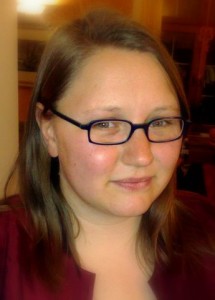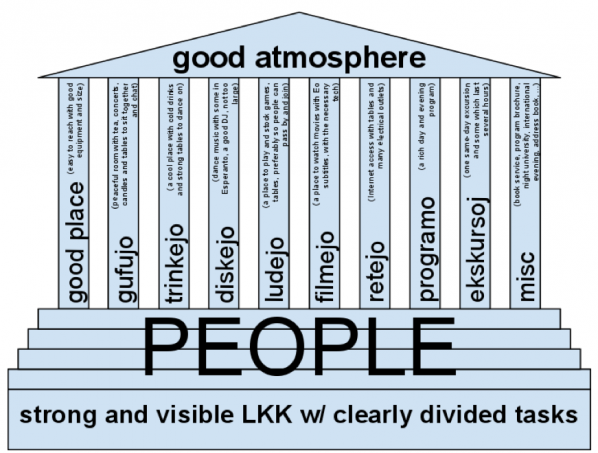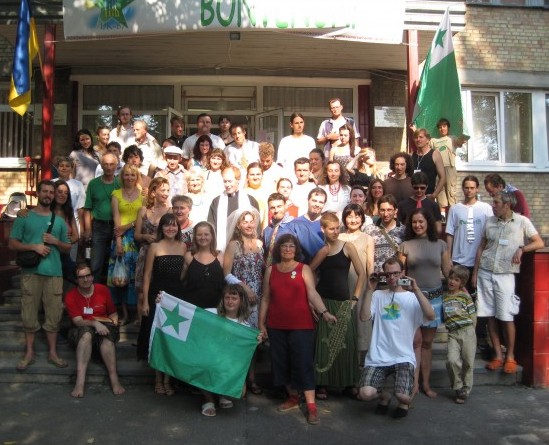“IJK is the people” Posted by Chuck Smith on Aug 4, 2011 in Events, IJK, Uncategorized
[Ĉi tiu artikolo legeblas en la originala Esperanto ĉe Libera Folio.]
Today I’m happy to have Carolin Weemeyer with me, a 29-year-old teacher in Germany who participated in the International Youth Conference of Esperanto (IJK) in Kiev. She provides us with an analysis of the previous IJK and the IJKs in general.
The above citation “La IJK estas la homoj” (The IJK is the people) was taken from Evgenia Slovachevskaya during the last night of the IJK. Evgenia took the role of main organizer from Mikaelo Lineckiy, who unfortunately suffered a heart attack two weeks before the IJK and had to stay in the hospital. In his speech, Evgenia explains that it was difficult for the LKK (Loka Kongresa Komitato) to take all the tasks from Mikaelo, among others because, “we don’t know what IJK is.” The last sentence was that despite the many problems and failures, the atmosphere was good, and that “IJK is the people.” Those sentences caught my attention and made me think a lot about IJK, and finally made me write this.
To explain where the following opinions come from: I attended every IJK from 2005 to 2011 except last year’s in Cuba. Besides that, from 2004 to 2009, I was a member of the GEJ-commission (German Esperanto Youth) for conferences, which prepared the Internacia Seminario (IS). I’ll summarize my experiences there with the following diagram:
The LKK (Loka Kongresa Komitato) forms the most important foundation. After that, the participants follow. Several columns hold up the roof, the good atmosphere, which I believe is the goal of the conference. It’s important to add, that not all columns are necessarily required. But missing several of them hinders the good atmosphere.
Let me analyze the previous IJK according to my diagram.
-
The LKK was quite weak due to losing Mikaelo to the hospital, as indicated above, which was not their fault. However, it’s worth adding, that for attendees, it wasn’t really clear who was responsible for which task. In fact, many people with which I spoke weren’t even clear who was in the LKK for the entire week. A simple way to show that is with differently colored badges and presentation photos in the program brochure.
During registration (which only took place starting on the second day!), one was asked when they prepaid (!) and they recalculated all costs according to the cost table on paper, so there was quite a wait. At the beginning, the participants could have put themselves in order by congress number, but that usually doesn’t matter during IJK and that’s why no one knew about it. It seems to me that there was no database nor registration data. This process for registration is certainly not recommended.
- People attended. As usual in a Esperanto youth meeting, there were many different kinds of people from diverse countries and cultures which carried the foundation for a good atmosphere.
- The place wasn’t suitable. One could talk at length about cold water, squat toilets and (the lack of) electricity in the rooms. My impression was that most people preferred another level of comfort, but somehow accepted or had to accept the lodging as it was. My own opinion: if there are those – for most attendees unusual – lacks of comfort, one should at least know that in advance (for example in the last informational brochure). And besides, toilet paper is not a luxury in my opinion. The biggest hole, however, was that there were hardly chairs and tables to freely chat. In addition, I was amazed how often the cleaning ladies took smoke breaks (I counted 11 times in 2 hours), while we drowned in garbage and dirt. The concert hall was quite small and offered chairs for a maximum of 30 people. Unfortunately, the location was very far from the city center.
- Gufujo (literally “owl container”, a place for people to peacefully chat and drink tea) was missing. There were several attempts by participants to start it, but they were in vain mostly due to missing things needed to run it. You need a quiet place, not necessarily away from everything else, tables, chairs and candles. The gufujo helpers boil water and offer nice and diverse teas, sugar, milk, maybe honey and lemon. Good evening additions are peaceful concerts and literature readings.
- Trinkejo existed. There it was possible to buy beverages at room temperature (there was no refridgerator) and some snacks. Besides, there were three chairs. But the bar is not just to buy drinks. It’s also usually a place to party and dance on tables. All of this wasn’t possible.
- About the diskejo I can’t say much, because I didn’t dance. I think, however, that it was suitable according to participants.
- Ludejo (a games place) didn’t exist. There were many game rounds in front of the house on the ground, and long werewolf (similar to the mafia card game) sessions on the first floor, but again without chairs and it was dirty. It was difficult to find players, because there was no common meeting place.
- A typical filmejo didn’t exist. Chuck Smith showed several cool films in the school one afternoon. However, there were some technical problems that needed to be solved.
- In the LKK office (!) there was an Internet connection starting on the second day. There were too few electrical outlets and chairs. So, it followed that you found many people in the room, but not usually members of the LKK.
- The day program was quite good. There were Esperanto courses, lectures, discussion groups, etc. The way the program was offered to the participants could have been improved, by example with a congress brochure.
- The concerts in the evening were successful. Except for not having enough space, places to sit or to mention the technical difficulties, they were brilliant. It would be worth taking the traditional IJK elements like the international evening with music, poems, sketches, etc. and games on stage like “Who wants to be a millionaire” or the like. For the international concert, a list was hanging on the program table, but nobody took it away in time. So, people didn’t know whether their proposal were noted or not.
- There was not one complete-day excursion to any place near the city, but there were seven excursions at the same time to different destinations in Kiev. I didn’t partipicate in an excursion (which started at noon, by the way), mostly because I was already in the city center on my own. Many people told me that the excursions were good. I did, however, observe the preparations. A poster was hanging on the program table with seven excursion proposals (numbers 1-7). Nearby hung 12 lists to register for the individual excursions. It wasn’t mentioned which number belongs to which excursion. Besides that, excursion guide names were listed. At least one of them didn’t know he was going to lead an excursion. On the excursion day, everyone from all the excursions met together in front of the house which made it take quite a long time to get everyone organized. I heard that they were planning to use the public busses to start the trip. I’m amazed how that could work, because they are usually full upon arriving at our bus stop. With more than ten people, it would be hard to enter.
- About miscellaneous topics, I don’t want to say a lot, because I think everything is already clear. I hope that we will still get our post-conference address book.
As was said, not all of those columns are necessary for a good IJK. For example in Hanoi, the columns “good place,” “excursions,” and “program” pretty much made up the entire building – because they were strong enough, even though the other columns were completely missing like trinkejo, gufujo, ludejo and filmejo.
In my humble opinion and after many chats with other participants, I think I can say that the “IJK-67” building fell apart quite strongly. Concisely: the IJK needs to be more than just the people.
I hope that my analysis is clear and understandable. I’m looking forward to reading your opinions about it. I hope as well, that it can help LKKs of future events analyze their preparations.
Thank you very much for your insight and analysis, Carolin. I’ll end this post with one huge success from the organization. They had a very nice press conference before the IJK which got picked up on national TV.

Build vocabulary, practice pronunciation, and more with Transparent Language Online. Available anytime, anywhere, on any device.
About the Author: Chuck Smith
I was born in the US, but Esperanto has led me all over the world. I started teaching myself Esperanto on a whim in 2001, not knowing how it would change my life. The timing couldn’t have been better; around that same time I discovered Wikipedia in it’s very early stages and launched the Esperanto version. When I decided to backpack through Europe, I found Esperanto speakers to host me. These connections led me to the Esperanto Youth Organization in Rotterdam, where I worked for a year, using Esperanto as my primary language. Though in recent years I’ve moved on to other endeavors like iOS development, I remain deeply engrained in the Esperanto community, and love keeping you informed of the latest news. The best thing that came from learning Esperanto has been the opportunity to connect with fellow speakers around the globe, so feel free to join in the conversation with a comment! I am now the founder and CTO of the social app Amikumu.







Comments:
Tim Owen:
Thank you, Carolin, for an insightful article. I hope that organisers of future events can use it as a reference. It’s not enough to try the cheap marketing trick of saying “YOU are the IJK!”, and not care about providing suitable accomodation.
*****
Dankon Carolin pro tiu tre sciiga artikolo. Mi esperas, ke organizantoj de estontaj eventoj ĝin ŭzu kiel helpilon. Ne sufiĉas simple uzi la senvaloran merkatada-trukon diri “VI estas la IJK” kaj samtempe rezigni pri respondecoj kiel provizado de taŭga loko.
Emcxjo:
WOW!
Kiam li alvenis en la festo-ejo, Platano diris: “Gxis nun mi kredis ke FESTO estas malbone organizita.
-Kaj?
-Kaj mi estis en IJK…”
Dankon pro la senkompata kaj objektiva raporto. Tio klare instigas nin bone fari por FESTO. Fakte ni havas tro da tabloj kaj segxoj cxi tie!
Emcxjo